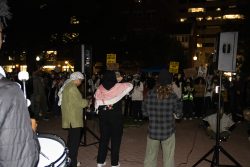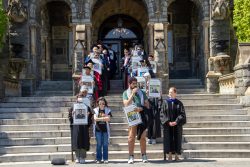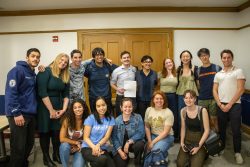An email newsletter sent out by GUSA on Jan. 30 publicized a petition that calls for greater transparency in the Foreign Language and Linguistics Department in regards to the use of Ph.D. candidates as instructors. Senator-at-Large Adam Shinbrot (COL ’18) published the petition on Jan. 24 and on Sunday GUSA Senate passed a bill expressing their support for it.
“I’m not addressing whether they are good or bad instructors,” Shinbrot said. He is only seeking to raise awareness of their training. “You should know that your tuition dollars are being put to good use to train Ph.D. candidates to instruct your classes, and instruct them well.”
The petition also asks the FLL to ensure that students have the contact information of those they can reach should there be a problem with their Ph.D.-candidate instructor.
“If you have a problem with a professor you go to the chair of the department, simple as that. If you have a problem with a Ph.D. candidate, sure you can go to the Chair of the Spanish department, but there’s also a lot of people who’re involved with the just the Ph.D. program,” Shinbrot said. “You should have their contact information if you have a problem.”
Gwen Kirkpatrick, chair of the Department of Spanish and Portuguese, believes this aspect of the petition is unnecessary. According to Kirkpatrick, the proper contact information is on the syllabus of every 100-level course in her department and can additionally often be found on Blackboard. She also believes there is no reason undergraduate students cannot come directly to the chair of the department with a complaint.
Student Cassidy Gasteiger (SFS ‘18), who expressed skepticism about the benefits of the petition, said, “Can’t they just talk to their dean? Isn’t that our point of contact if we have problems with our professors?”
Kirkpatrick expressed her enthusiasm for the other parts of the petition. Emphasizing how extensive the Ph.D. candidate instructor program is, she explained “They should tell people what they’re doing. … We could make ourselves better understood.”
Shinbrot has said the motivation for the petition stemmed from his own lack of understanding in a past class. “When I was in my class I thought ‘Okay, I’m paying all this money to go to school and my instructor has no training.’” Only after looking into the matter further did he realize this was not the case.
According to Kirkpatrick, Ph.D. candidates receive special training in second language acquisition and linguistics, taught by prominent professors in the field. “This is where Georgetown is distinctive,” Kirkpatrick said. “I’ve never seen such a well-developed system of language instruction.”
Instructors in the Spanish department have backgrounds in areas such as anthropology, ethnography, and comparative literature and are pursuing their doctorates in similar areas while specializing in Spanish speaking regions. Many have taught at the college level before joining the Ph.D. program, and are all observed by professors or teaching assistants.
Ph.D. candidate and Spanish instructor Yoel Castillo Botello hopes this petition might help those Ph.D. candidates who are working hard to teach classes, on top of their doctorate workload. “I think that our department strives to give us as much support as they can, but university-wide there should be more support for Ph.D. candidates who are actually full instructors.”
Shinbrot believes both students and faculty will receive his proposal well. “I don’t think this is something that is that difficult…. I don’t think that anyone would have a negative reaction to this.”




